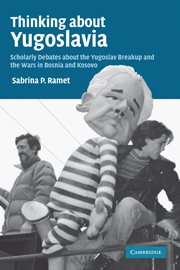 Thinking about Yugoslavia
Thinking about Yugoslavia Book contents
- Frontmatter
- Contents
- Preface
- List of books discussed
- Glossary
- 1 Debates about the war
- 2 The collapse of East European communism
- 3 The roots of the Yugoslav collapse
- 4 Who's to blame, and for what? Rival accounts of the war
- 5 Memoirs and autobiographies
- 6 The scourge of nationalism and the quest for harmony
- 7 Milošević's place in history
- 8 Dilemmas in post-Dayton Bosnia
- 9 Crisis in Kosovo/a (with Angelo Georgakis)
- 10 Debates about intervention
- 11 Lands and peoples: Bosnia, Croatia, Slovenia, Serbia
- 12 Southern republics: Macedonia and Montenegro in contemporary history
- 13 Conclusion: controversies, methodological disputes, and suggested reading
- Index
- References
6 - The scourge of nationalism and the quest for harmony
Published online by Cambridge University Press: 22 September 2009
- Frontmatter
- Contents
- Preface
- List of books discussed
- Glossary
- 1 Debates about the war
- 2 The collapse of East European communism
- 3 The roots of the Yugoslav collapse
- 4 Who's to blame, and for what? Rival accounts of the war
- 5 Memoirs and autobiographies
- 6 The scourge of nationalism and the quest for harmony
- 7 Milošević's place in history
- 8 Dilemmas in post-Dayton Bosnia
- 9 Crisis in Kosovo/a (with Angelo Georgakis)
- 10 Debates about intervention
- 11 Lands and peoples: Bosnia, Croatia, Slovenia, Serbia
- 12 Southern republics: Macedonia and Montenegro in contemporary history
- 13 Conclusion: controversies, methodological disputes, and suggested reading
- Index
- References
Summary
Among the questions scholars have raised, reflecting on the brutalities committed by all sides and the suffering experienced by innocents in all the republics affected (Slovenia, Croatia, Serbia including Kosovo, and Bosnia-Herzegovina), has been how it was possible for people who had lived, in some cases, literally as neighbours, to turn on each other with such brutality. In the process, scholars have endeavoured both to trace the sources of intercommunal violence and to suggest, in some cases, what might constitute important preconditions for, or ingredients in, social harmony. These concerns transcend the supposed boundary between the humanities and the social sciences and have, in other contexts over the centuries, been addressed by such diverse luminaries as Plato, St Thomas Aquinas, Thomas Hobbes, John Stuart Mill, Samuel P. Huntington, and Giuseppe Di Palma.
For most scholars, including in this instance Misha Glenny, Robert M. Hayden, Rusmir Mahmutćehajić, Stjepan G. Meštrović and his collaborators, and Nebojša Popov and his collaborators, the answer to the question why includes, of necessity, some reference to particular policies and programmes adopted by specific, identifiable elites, though this is not to suggest that any of these authors would consider ‘bad leadership’ to be a full or adequate explanation for the intercommunal violence which broke out in the Yugoslav region in the early 1990s. The question why may, of course, also be referred to an account of the use made of the media and of other means of propaganda in order to change the way people view one another and treat one another, or to the role played by organized crime in the war.
Information
- Type
- Chapter
- Information
- Thinking about YugoslaviaScholarly Debates about the Yugoslav Breakup and the Wars in Bosnia and Kosovo, pp. 138 - 158Publisher: Cambridge University PressPrint publication year: 2005